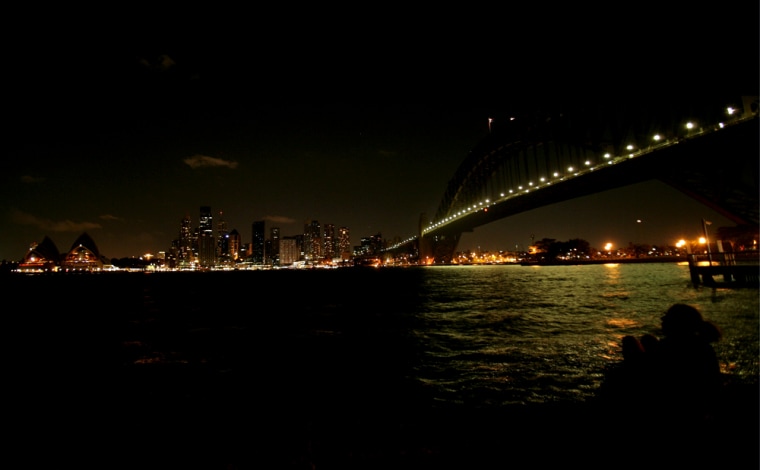Australia’s largest city dimmed on Saturday night as businesses and homeowners switched off the lights to draw attention to global warming.
The normally gleaming white sails of the Sydney Opera House darkened, and so did the iconic harbor bridge and chunks of the city skyline. Security and street lights, as well as those at commercial port operations, stayed on.
Throughout the city of about 4 million people, residents turned off the lights for one hour in an event organized by environmentalists and supported by Sydney city officials, the New South Wales state government and thousands of businesses.
Restaurants throughout the city announced candlelight-only specials, and families gathered in parks and other public places to take part in a countdown to lights out, sending up a cheer when the switch was flicked at 7:30 p.m. local time.
‘A call to action’
Saturday’s event kicked off a campaign to encourage Sydney residents to conserve energy by turning off lights, computers and other electrical equipment when they’re not being used — steps that could cut Sydney’s greenhouse gas emissions by 5 percent a year.
“Tonight is really important because it’s a call to action,” Sydney Mayor Clover Moore told Sky News. “We are asking people to think about the action they can take to fight global warming. We all have to act to reduce out ecological footprint.”
Australia, a nation of around 21 million people, is ranked as the world’s worst greenhouse gas emitter per capita, largely because of its heavy reliance on coal-fired power stations.
Leaked excerpts of the latest report by the Intergovernmental Panel on Climate Change (IPCC), the U.N. network of 2,000 scientists, say average temperatures in Australia could rise 6.7 degrees by 2080, bringing more wildfires, floods, drought and storms.
Rising sea temperatures is already causing more coral bleaching on reefs such as the Great Barrier Reef, the report warns.
More than 250 people went to the city’s observatory to use the darkened skies to look further into space, though light from a nearly full moon was expected to dim the glow of the stars.
Astronomy curator Nick Lomb said views of Saturn, the constellation of Orion’s Belt and the Southern Cross’ fifth star — which has been almost lost from city skies in Australia — would be more easily seen.
Sydney is not the first place to cut the lights for conservation. In February, Paris and other parts of France dimmed the lights for five minutes in a similar gesture. Iconic buildings in Rome and Athens joined the Eiffel Tower in going dark, as other cities supported the effort.
